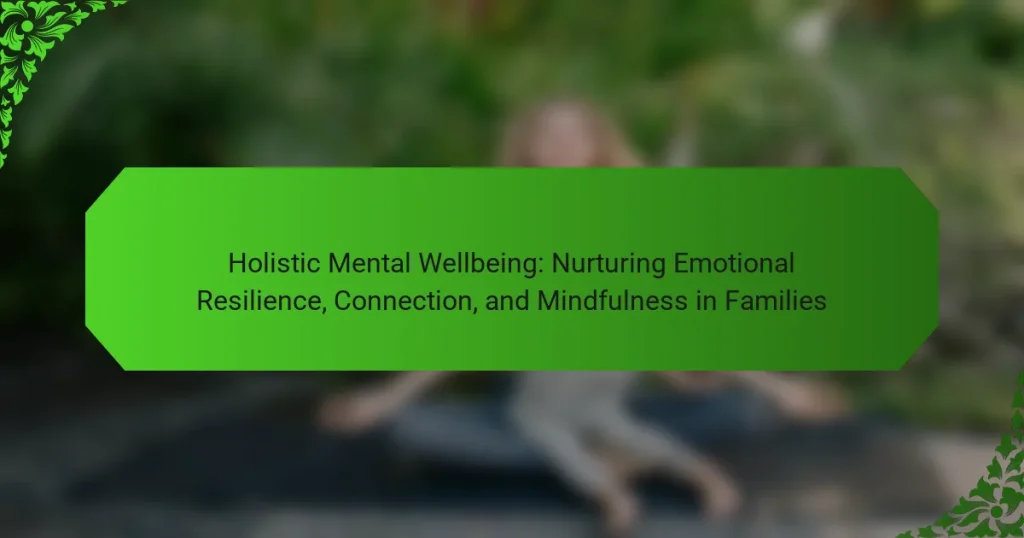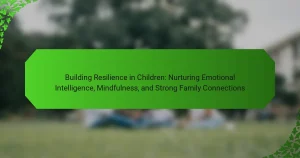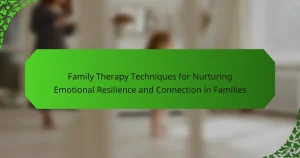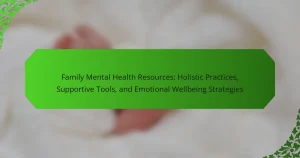Holistic mental wellbeing enhances family dynamics by nurturing emotional resilience, fostering connection, and promoting mindfulness. This article explores effective practices for building open communication, engaging in shared mindfulness activities, and creating a supportive environment. Strategies such as gratitude practices, intergenerational storytelling, and nature immersion will be discussed to strengthen emotional ties and overall mental health.
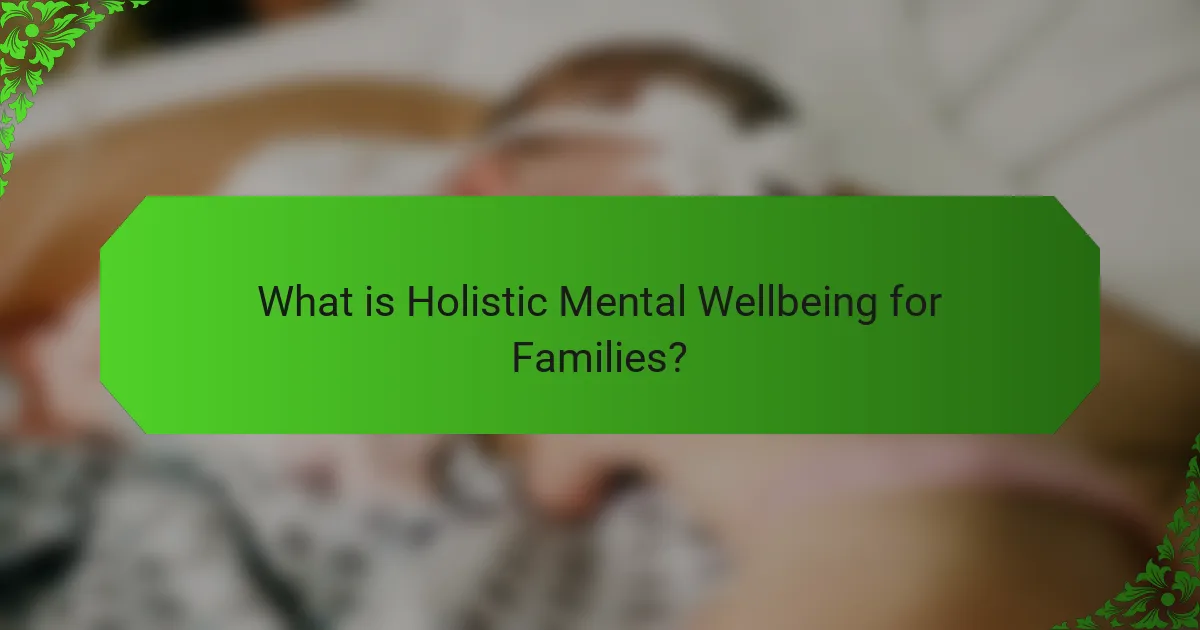
What is Holistic Mental Wellbeing for Families?
Holistic mental wellbeing for families focuses on nurturing emotional resilience, fostering connection, and promoting mindfulness. This approach integrates mental, emotional, and social health, creating a supportive environment. Families practicing holistic wellbeing often experience improved communication and stronger relationships. Engaging in shared mindfulness activities can enhance emotional connections, leading to greater overall satisfaction and resilience.
How does holistic mental wellbeing differ from traditional mental health approaches?
Holistic mental wellbeing emphasizes emotional resilience, connection, and mindfulness, differing from traditional approaches that often focus on symptom management. Holistic methods consider the individual’s entire life context, including relationships and personal growth. Traditional mental health approaches typically prioritize clinical diagnoses and treatments, often overlooking emotional and social factors. This broader perspective in holistic practices fosters deeper connections and promotes long-term wellness.
Why is emotional resilience important for families?
Emotional resilience is crucial for families as it fosters stronger connections and effective coping strategies. Families with high emotional resilience can navigate challenges together, enhancing overall mental wellbeing. This resilience promotes open communication, reducing stress and conflict. Research indicates that families with emotional resilience exhibit better problem-solving skills and adaptability, leading to healthier relationships. By nurturing emotional resilience, families create a supportive environment that fosters growth and mindfulness.
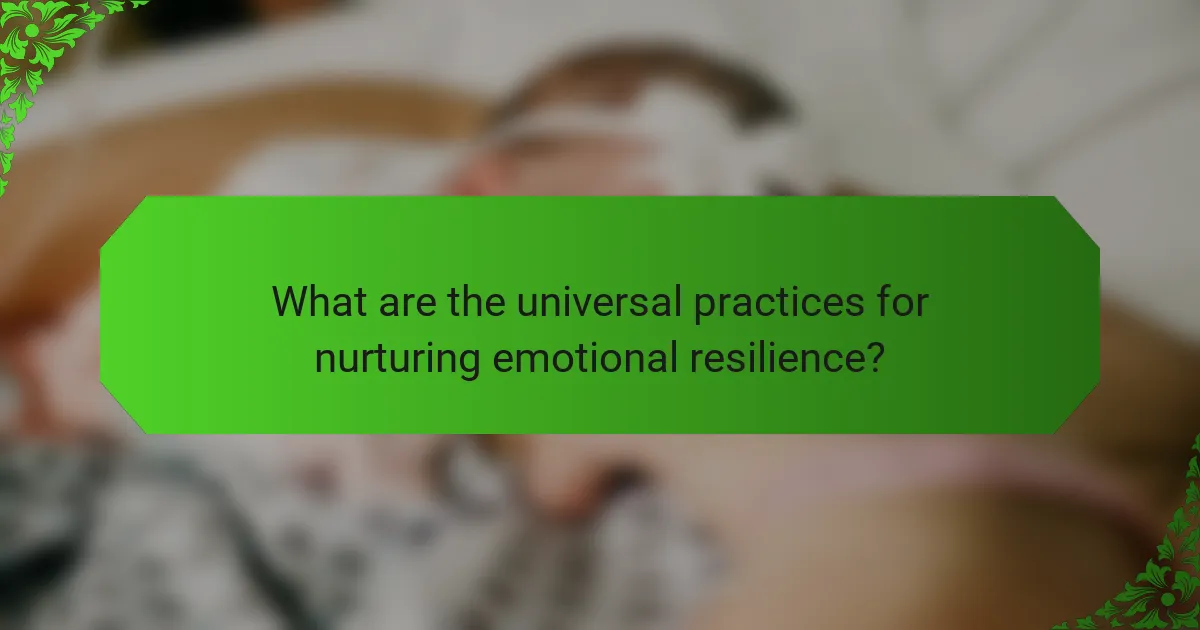
What are the universal practices for nurturing emotional resilience?
To nurture emotional resilience, families should engage in practices that promote connection, mindfulness, and holistic mental wellbeing. Key practices include fostering open communication, encouraging emotional expression, and practicing mindfulness together. Regular family activities that promote bonding, such as shared meals or outdoor adventures, strengthen relationships. Additionally, teaching coping strategies for stress and adversity helps build resilience. Establishing a supportive environment where each member feels valued enhances emotional health. Mindfulness practices, such as meditation or deep breathing, can also be incorporated to improve emotional regulation and awareness.
How can open communication strengthen family bonds?
Open communication strengthens family bonds by fostering trust, understanding, and emotional support. It encourages family members to express their feelings and thoughts, leading to deeper connections. Studies show that families with open communication report higher levels of emotional resilience and mindfulness. This environment nurtures a sense of belonging, which is crucial for holistic mental wellbeing. By regularly engaging in honest dialogues, families can navigate challenges together, reinforcing their unity and emotional strength.
What techniques promote active listening among family members?
To promote active listening among family members, encourage open dialogue, validate feelings, and practice reflective listening. These techniques foster emotional connection and resilience.
1. Establish a safe space for sharing thoughts and feelings.
2. Use nonverbal cues like eye contact and nodding to show engagement.
3. Summarize what others say to confirm understanding.
4. Ask open-ended questions to deepen conversations.
5. Avoid interrupting and allow pauses for reflection.
What role does empathy play in family dynamics?
Empathy is crucial for fostering healthy family dynamics. It enhances emotional resilience, strengthens connections, and promotes mindfulness among family members. Empathetic interactions lead to better communication, reducing conflicts and misunderstandings. As a result, families experience increased trust and support, essential for holistic mental wellbeing. Studies show that families practicing empathy report higher levels of satisfaction and emotional stability.
How can shared activities enhance emotional resilience?
Shared activities significantly enhance emotional resilience by fostering connection and mindfulness within families. Engaging in collaborative tasks promotes communication, strengthens bonds, and reduces stress. For instance, family game nights or cooking together create shared experiences that build trust and understanding. These activities serve as a unique attribute of holistic mental wellbeing, providing emotional support and reinforcing positive relationships. As a result, families develop a stronger capacity to navigate challenges together, enhancing overall emotional resilience.
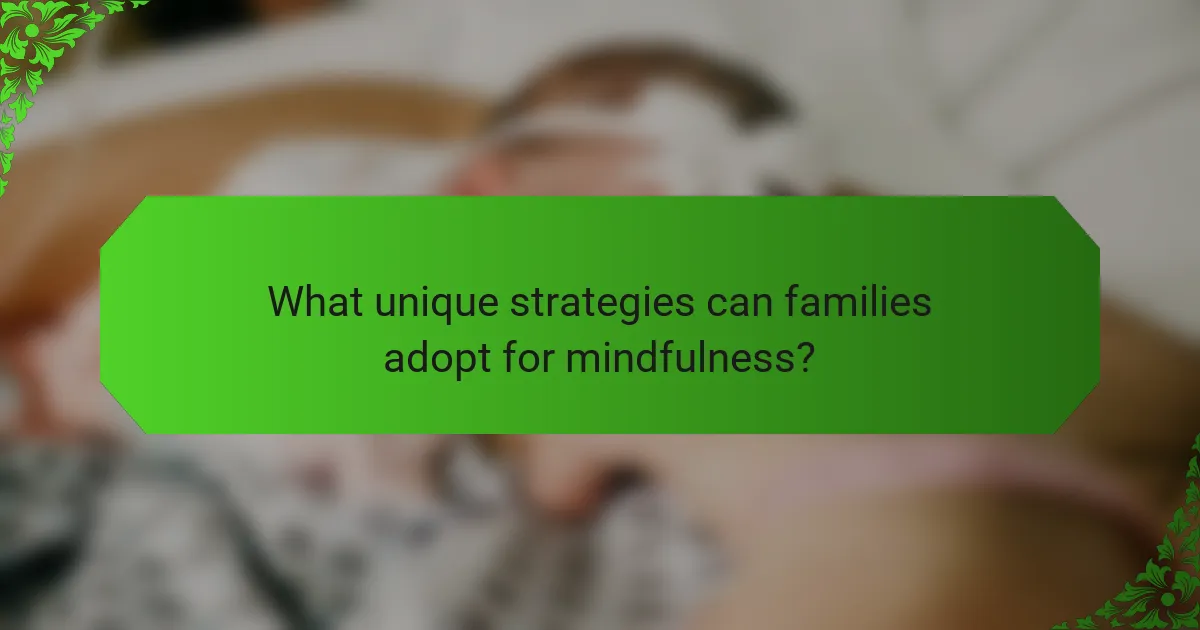
What unique strategies can families adopt for mindfulness?
Families can adopt unique strategies for mindfulness by integrating practices that enhance emotional resilience and connection. One effective approach is to establish a daily mindfulness routine, such as meditation or mindful breathing exercises, which can be done together. This fosters a shared experience that strengthens family bonds.
Another strategy involves creating a mindful environment at home. This can include designated quiet spaces for reflection and discussions about feelings, promoting open communication. Engaging in nature walks as a family also cultivates mindfulness by encouraging presence and appreciation of the surroundings.
Incorporating gratitude practices, like sharing daily highlights or expressing appreciation for one another, can enhance emotional resilience. These activities build a positive atmosphere and encourage supportive family dynamics.
Lastly, utilizing storytelling as a mindfulness tool can help families connect on deeper emotional levels. Sharing personal experiences or reading together fosters empathy and understanding, reinforcing emotional ties.
How can mindfulness practices be integrated into daily family life?
Integrating mindfulness practices into daily family life enhances emotional resilience and connection. Start by establishing a daily mindfulness routine, such as morning meditation or evening reflection. Encourage family members to share their feelings, fostering open communication. Incorporate mindful activities, like nature walks or cooking together, to strengthen bonds. Finally, practice gratitude as a family, which cultivates a positive mindset.
What are some effective mindfulness exercises for children?
Mindfulness exercises for children can effectively enhance emotional resilience and connection. Here are some effective techniques:
1. Breathing Buddies: Children lie down with a stuffed animal on their stomach. They focus on making the animal rise and fall with their breath.
2. Mindful Coloring: Using coloring books encourages children to focus on colors and patterns, promoting relaxation and presence.
3. Nature Walks: Observing nature during walks helps children practice awareness and appreciation of their surroundings.
4. Gratitude Journals: Writing or drawing things they are thankful for fosters positive thinking and emotional expression.
5. Body Scans: Guiding children to pay attention to different body parts helps them connect with their physical sensations and emotions.
What benefits do family mindfulness retreats offer?
Family mindfulness retreats offer numerous benefits that enhance emotional resilience and connection. These retreats foster improved communication, reduce stress, and promote a deeper understanding among family members. Participants engage in activities that cultivate mindfulness, leading to increased emotional awareness and regulation. As a result, families often report strengthened bonds and a more harmonious home environment. Additionally, these retreats provide unique opportunities for shared experiences that contribute to lasting memories and personal growth.
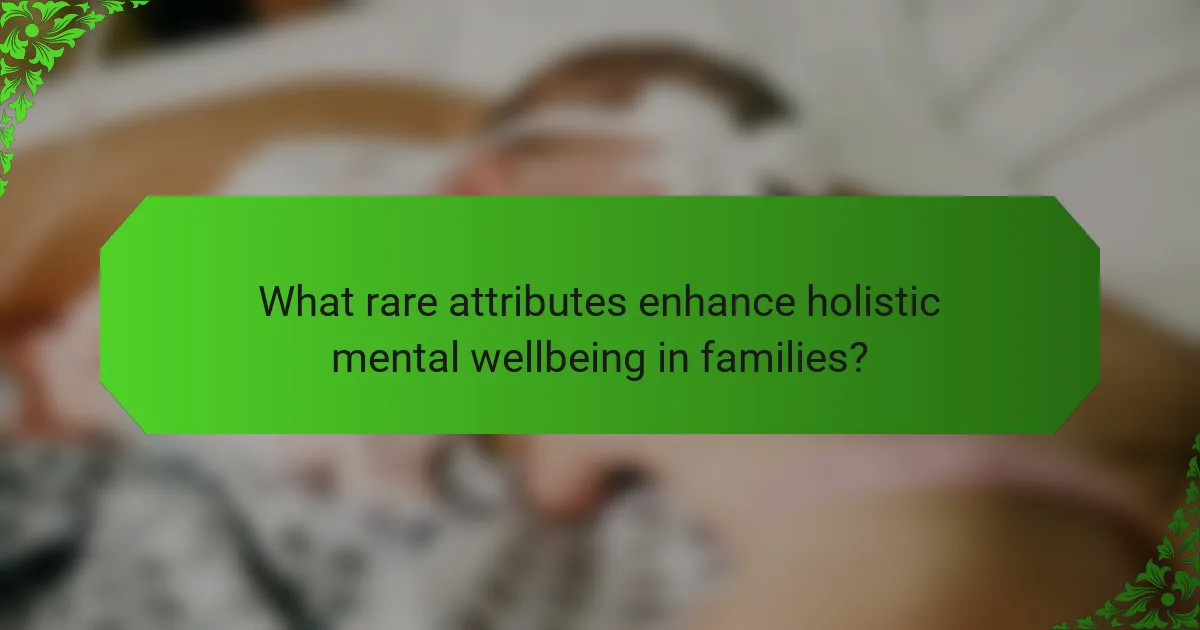
What rare attributes enhance holistic mental wellbeing in families?
Cultivating rare attributes such as emotional agility, intergenerational storytelling, and nature immersion enhances holistic mental wellbeing in families. Emotional agility allows families to navigate challenges with resilience. Intergenerational storytelling fosters connection and shared values, promoting emotional support. Nature immersion reduces stress and enhances mindfulness, creating a calming environment for family interactions. These attributes contribute to a well-rounded approach to mental health, ensuring families thrive together.
How can creative expression foster emotional connection?
Creative expression fosters emotional connection by allowing individuals to share personal experiences and feelings. Through art, music, or writing, families can communicate emotions that may be difficult to express verbally. This shared creative process enhances understanding and empathy among family members, strengthening bonds. Engaging in creative activities together promotes mindfulness, as participants focus on the present moment, which is vital for emotional resilience. Research indicates that families who engage in creative expression report higher levels of emotional well-being and connection.
What role does nature play in improving family mental health?
Nature significantly enhances family mental health by promoting emotional resilience and mindfulness. Exposure to natural environments reduces stress and anxiety, fostering stronger family connections. Studies show that spending time outdoors can improve mood and cognitive function, leading to healthier family dynamics. Engaging in nature-based activities, such as hiking or gardening, nurtures communication and teamwork within families, ultimately supporting holistic mental wellbeing.
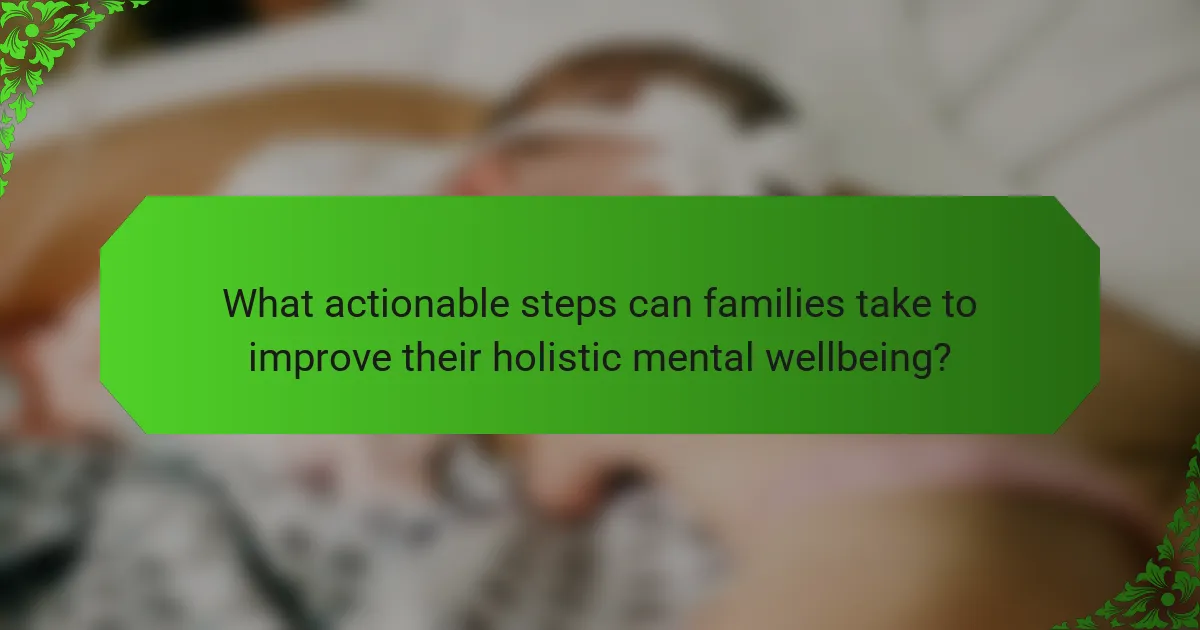
What actionable steps can families take to improve their holistic mental wellbeing?
Families can enhance holistic mental wellbeing by fostering emotional resilience, connection, and mindfulness. Start by establishing open communication, encouraging family members to share their feelings without judgment. Incorporate regular family activities, such as game nights or outdoor excursions, to strengthen bonds and create shared experiences. Mindfulness practices, like meditation or yoga, can be integrated into daily routines, promoting relaxation and focus. Additionally, prioritize mental health education, equipping each family member with tools to manage stress and emotional challenges. These actionable steps cultivate a supportive environment, essential for overall mental wellbeing.
What common mistakes should families avoid in their holistic wellbeing journey?
Families should avoid neglecting open communication, dismissing emotional needs, and overlooking self-care in their holistic wellbeing journey. Prioritizing these aspects fosters emotional resilience and strengthens family connections. Common mistakes include focusing solely on physical health, which can undermine mental wellbeing. Additionally, failing to practice mindfulness may lead to increased stress and disconnection. Establishing a balanced approach that integrates emotional support, mindfulness practices, and family bonding activities is essential for nurturing holistic mental wellbeing.
How can families create a supportive environment for mental wellbeing?
Families can create a supportive environment for mental wellbeing by fostering open communication, promoting emotional expression, and practicing mindfulness together. Encouraging regular family discussions about feelings helps build emotional resilience. Engaging in activities like yoga or meditation cultivates mindfulness and strengthens connections. Establishing routines that include family time enhances stability and support. Providing a safe space for children to express their emotions without judgment is crucial for their mental health.
What are the best practices for maintaining emotional resilience over time?
To maintain emotional resilience over time, prioritize self-care, cultivate strong relationships, and practice mindfulness. Regular physical activity enhances mood and reduces stress. Engaging in open communication with family fosters connection and support. Mindfulness techniques, such as meditation and deep breathing, promote emotional regulation. Establishing routines can provide stability and predictability, which are crucial for resilience. Finally, seeking professional help when needed can further strengthen emotional health.
